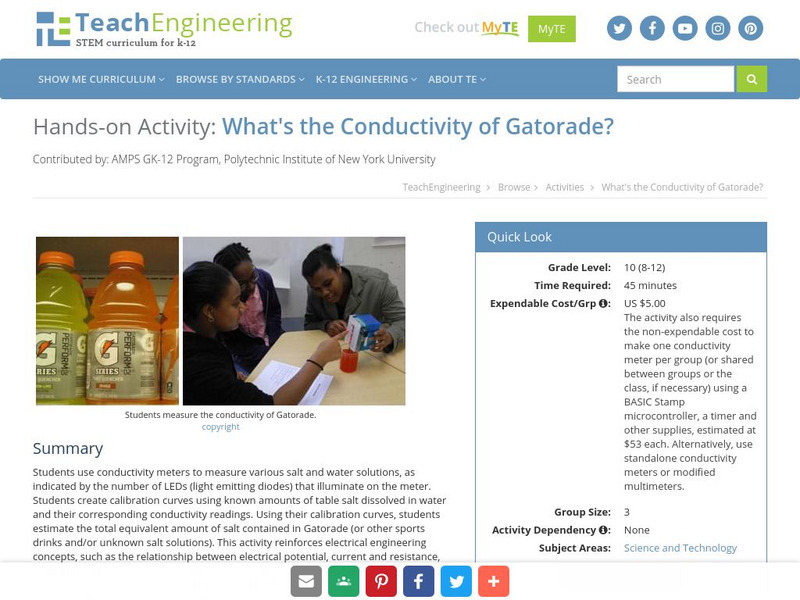Curated OER
Origin of Coal
Students explore how coal is formed. They then discuss the information and answer any questions that they may have on the formation of coal. Students then answer questions in reference to the coal discussion and reading.
Curated OER
Nutrition and Health
Students explore the conditions faced while sailing on the ocean regarding health and physical fitness. They experience the importance of Vitamin C. Students analyze the cause of many diseases and sicknesses on the ships.
Curated OER
Hang in There
Students view a video clip about bridges. They examine the cables that stablize the Golden Gate Bridge. They relate this concept to elevators.
Curated OER
What Stores Solar Energy Best?
Middle schoolers discuss reasons and methods for keeping a home warm in winter and cool in summer as examples of energy storage. Students participate in a solar energy experiment.
Curated OER
Downhill Discoveries
Students are involved in hands-on activities to determine how course conditions affect bobsled, luge, and downhill ski races.
Curated OER
Heritage: Famous People of the West
Fourth graders examine two famous people, Brigham Young and Jim Bridger, who made an impact on the westward expansion, and create cartoon strip using the information.
Curated OER
Simple Simon Saves the Day
Students recognize, identify, and locate the /s/ sound in spoken or written words. They say a tongue twister with words emphasizing the /s/ sound. They then listen to the story "Simple Simon" and make "finger snakes" whenever they hear...
Curated OER
Columbus' Voyage to the New World
Students develop cooperation skills and to teach rules and how to follow them. Students create voyage card. They discuss and decide on some situations that may have or did occur to the crew during Columbus voyage to the new world. ...
Curated OER
What Do Concentrations Mean?
Students investigate the concept of climate gases and practice using the appropriate measurement terms. The lesson includes information that is used by the teacher to conduct class discussion or as a source of background for students.
Curated OER
Where Do Fish Live in the Hudson?
Students explore the environmental factors that influence where fish live and determine the makeup of fish communities in the Hudson. They interpret guided observations and measurements to assess patterns, sequences and relationships.
Curated OER
The Flat-Out Truth
In this Earth's shape worksheet, students read an article about a gentleman who believes the Earth is flat. Then students complete 5 short answer questions.
Curated OER
From Slavechild to Freedom
Third graders read excerpts from 5 slave narratives and study and compare/contrast their families, living conditions, duties, methods of escape and destinations. In this history lesson, 3rd graders get into small groups to present their...
Exploratorium
Exploratorium: Salt Volcano
By making oil float on water--with the help of other ingredients--students can create a lava-lite effect.
Utah Education Network
Uen: Nhmu: Boy, Is That Buoyant!
Learn how salt increases the density of water and creates a condition of buoyancy.
TeachEngineering
Teach Engineering: How Cold Can You Go?
Students explore materials engineering by modifying the material properties of water. Specifically, they use salt to lower the freezing point of water and test it by making ice cream. Using either a simple thermometer or a mechatronic...
TeachEngineering
Teach Engineering: What's the Conductivity of Gatorade?
Students use conductivity meters to measure various salt and water solutions, as indicated by the number of LEDs (light emitting diodes) that illuminate on the meter. Students create calibration curves using known amounts of table salt...

















